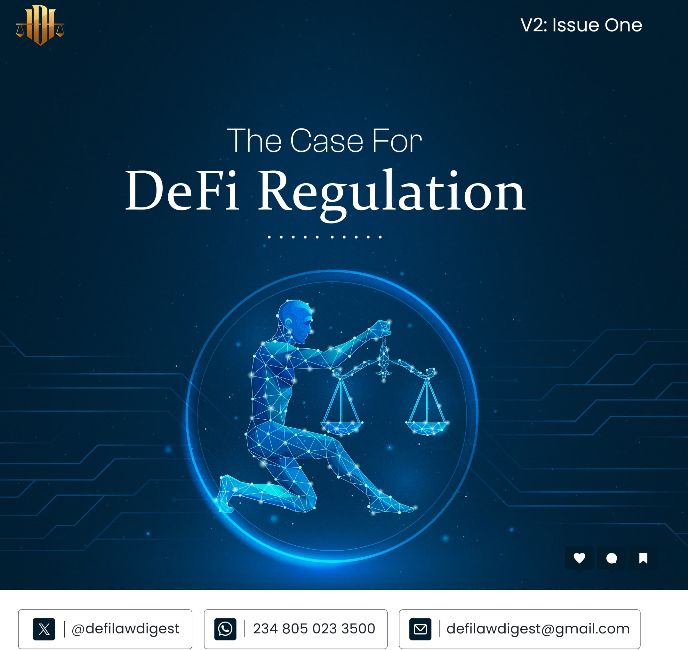By Ayomide Ogunsakin
The main aim of DeFi is to give individuals financial control of their assets and birth a financial system that is censorship free and accessible to everyone.
This is why it would seem rather ironic to advocate that the DeFi industry should be regulated, as such regulation can potentially give power back to the same centralized authorities that DeFi shields its users from.
However, the motive behind crypto regulation is not too far fetched.
Despite its really prospective future and the attractive use cases that it already offers, the Crypto and DeFi space has witnessed many scams, cyberattacks, embezzlements — like the FTX saga that resulted in a staggering $8 billion loss— as well as money laundering schemes, all of which have immensely affected user funds and the wellbeing of the industry.
Aided by this is the lack of accountability, due to the fact that DeFi applications are built on decentralized systems which anonymously distribute functions by taking power away from a central location or authority.
While it possesses some benefits, the reality is that this anonymity makes it difficult to hold specific persons or entities accountable for the technological or security failures that eventually lead to hacks, stealing of digital assets or other illicit activities.
Additionally, some users of DeFi protocols may not be sophisticated or techy enough to understand how they operate. But if the goal is for DeFi to thrive on a global scale, then such users must benefit from Consumer Protection Policies.
Flowing from this view that consumers must be protected, it follows that crypto service providers must also be licensed, registered and authorized through well structured criteria, to safeguard the interests of users.
Essentially, DeFi needs regulation to successfully evolve.
So what’s the way forward?
DeFi presents a paradigm shift from traditional financial laws; it is decentralized, transparent and involves self-custody. TradFi laws which are designed for centralized entities, may struggle to address DeFi. For instance, decentralized lending platforms may not fall neatly into the methods and regulations guiding loans/lending of funds in the traditional financial system.
Since DeFi invents a new atmosphere of risks, rewards and tools, it equally requires an entirely different approach to regulation; a system that can effectively regulate DeFi activities, in alignment with the essentials of the technology.
To avoid a “square peg in round hole” situation, it is important for there to be appropriate, well suited regulations that address the intricacies of DeFi.
This births the Code is Law approach which suggests that the best tool for designing effective DeFi policies is the DeFi infrastructure itself, because code can be more efficient.
AML-KYC requirements have been proposed as channels through which this can be achieved.
In this case, the regulation is built into DeFi protocols. For instance, building KYC requirements into actual protocols and making the protocol verify the authenticity of a token.
Wallet whitelists could also be used by software devs to infuse KYC obligations into permissioned protocols. The software would be exactly the same as the permissionless protocol, which currently powers and gives access to DeFi networks the need for KYC.
This is already being applied by Aave (an open source DeFi lending protocol) for its corporate clients.
Thus, there could be a permissioned and a permissionless version of the same protocol with users in the permissioned one all fulfilling KYC/AML requirements and also aware that they are transacting with all parties who have fulfilled KYC/AML obligations.
Zero-knowledge (zk) proofs can also be applied for better effect. Through cryptography, zkproof technology tackles the privacy and traceability concerns by enabling users carry out the KYC process themselves.
While many DeFi users may resist the KYC method due to its attachment to centralized systems and lack of privacy, the fact remains that a lack of this standard in DeFi fuels illegal purposes including money laundering and embezzlement of funds in the ecosystem.
However, the KYC process, if infused into DeFi systems, may afford users the opportunity to get the best of both worlds; they can pass the necessary regulatory checks set by service providers to curtail illicit activities through KYC, without having to input personal details. This allows users to maintain their privacy.
Furthermore, asides the traditional methods of monitoring suspected money laundering or other illegal activities carried out across DeFi protocols, regulators can utilize the transparency of the system by tapping into the streams of real-time data available on several blockchain networks as well as Onchain Analytics tools to efficiently track such activities.
To make these proposed moves effective, there must be a collective effort of regulatory bodies, industry stakeholders, experts like software developers, and the DeFi community at large.
DeFi has evolved immensely and to further cement its credibility globally, regulatory provisions in tandem with its peculiarities must lead the way.
Dear readers, we really need your support to keep on serving you with authoritative, truthful, and juicy stories everyday. For your support, please reach out to the editor @gavelinternational66@gmail.com

